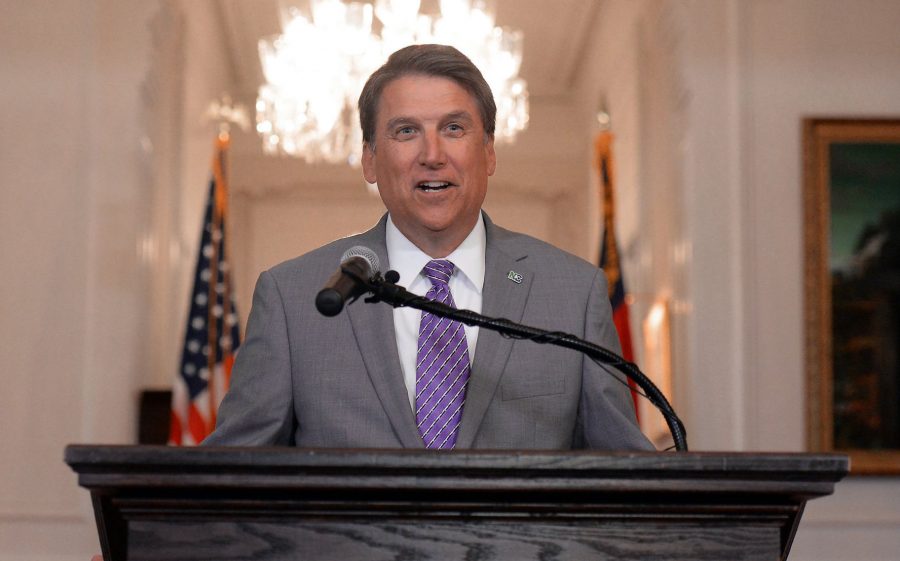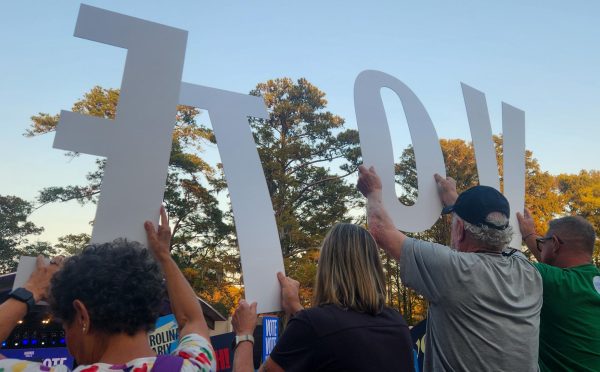N.C. Gov. Pat McCrory’s legacy
N.C. Gov. Pat McCrory speaks to the media Monday, May 9, 2016. He was announcing he has filed a lawsuit asking a federal court to determine that the controversial House Bill 2 is not illegally discriminatory. (Chuck Liddy/Raleigh News & Observer/TNS)
Holding office since 2013, Gov. Pat McCrory (R) has decided North Carolina’s government is still in need of his presence and is running for reelection this voting season against his opponent, Roy Cooper (D).
McCrory, who has gained much national attention for many controversial North Carolina laws passed under his administration, has often found himself defending his operative reasoning for running the state.
Three of the most identifiable accounts of power struggles between McCrory’s state government against the federal government were all dispatched under his approval: House Bill 2, the voter identification law and the gerrymandering of the state.
House Bill 2, more commonly known as “HB2” or “the bathroom bill,” was passed and signed within the same night of proposal and has been criticized as hindering the power of local authority and being discriminatory against the transgender community, according to the Charlotte Observer.
Ordering transgender individuals to use the restroom that matches their biologically assigned sex is the main association of this bill. However, McCrory included many more terms and regulations.
HB2 includes the elimination of any state law claim for wrongful termination of an employee on the basis of national origin, ethnicity, race, sex, and religion, according to Rick Glazier, former Democratic member for the North Carolina’s House of Representatives.
Although federal government did not strike down HB2, McCrory’s voter-ID laws were considered unconstitutional and deemed racially targeted.
After compiling demographical information on racial voting patterns, the McCrory administration crafted and enacted the voter-ID laws which eliminated same day registration, a number of early voting days and required photo identification on site of voting.
The law was brought to the attention of the federal courts and was soon after considered to have been carried out with the intent to discriminate against African Americans, thus violating the Voting Rights Act and the Constitution, according to The Washington Post.
“North Carolina’s history of voting discrimination, the surge in African American voting, the legislature’s knowledge that African Americans voting translated into support for one party, […]the swift elimination of the tools African Americans had used to vote and imposition of a new barrier at the first opportunity to do so cumulatively and unmistakably reveal that the General Assembly used [the law] to entrench itself,” said Diana Motz, a circuit judge in the appellate court who took part in handling the case.
In addition to this ordeal, McCrory faced backlash from the federal courts once more when the gerrymandering, or redistricting, of the state was deemed unconstitutional.
In Harris v. McCrory, the drawing of district lines in N.C. were considered to have been on the basis of intentionally segregating black voters and attempting to achieve “racial quotas” within each district, according to ThinkProgress, a liberal political news website.
During McCrory’s term, he has often found himself defending state legislation against the hierarchy of government; however, under his administration, residents have seen North Carolina’s economy shift for the better.
Taking office soon after North Carolina’s recession—which affected budget cuts for the state and unemployment rates gravely—McCrory’s administration took the task head-on, and the economic state of North Carolina has seen itself improve around the same time.
McCrory’s term in office coincided with the creation of 300,000 net new North Carolina jobs, setting the unemployment rate at the lowest it has been in eight years, and also during his term, there has been $4.4 billion in tax relief for the middle-class and small businesses, according to the government’s statistics.
The state, which faced a crumbling market since 2011, has now overturned its budget shortfalls into a $425 million budget surplus under the McCrory administration, paying off $2.5 billion in unemployment insurance debt to federal government, according to the government’s statistics.
Although the University of North Carolina school system has faced budget cuts, hurting higher education, McCrory has sponsored many lower education benefits and improvements.
Aside from the dispute about a one-time gift, McCrory has increased average teacher pay to over $50,000 plus benefits, while also ensuring North Carolina’s 4-year high school graduation rates at an all-time high, according to the government’s statistics.
McCrory’s accomplishments and downfalls have both boosted and reduced support for his reelection. It is ultimately up to voters to decide at what costs North Carolina will face for the decision in our new governor.
Malia Benison, @MaliaBenison












